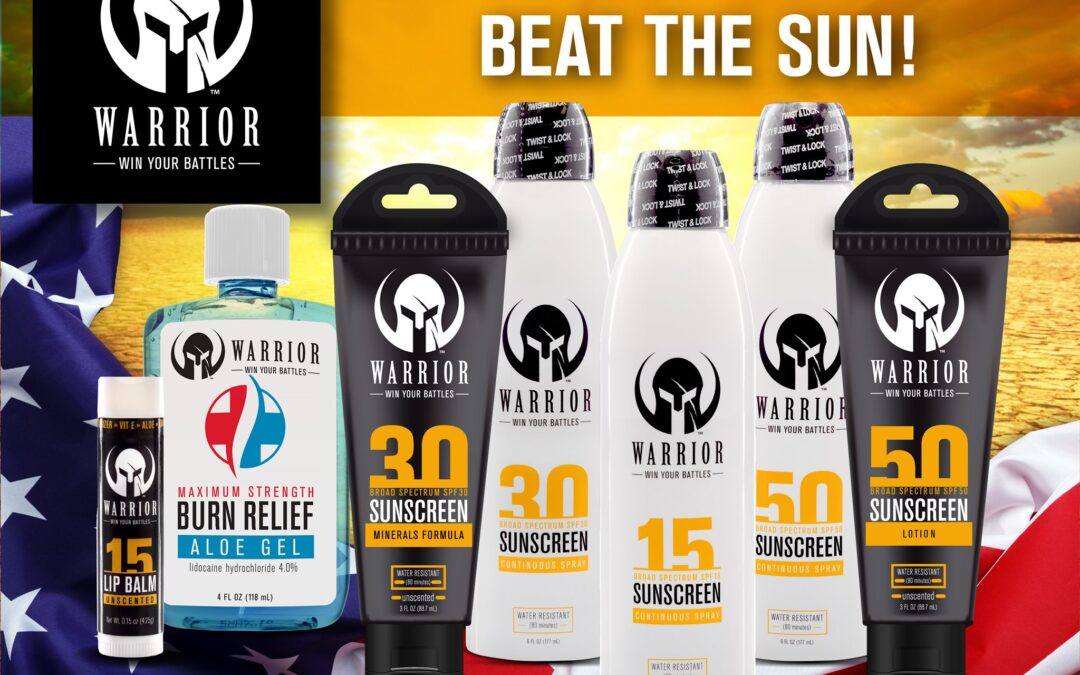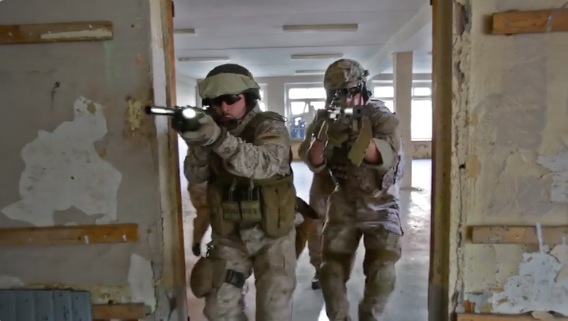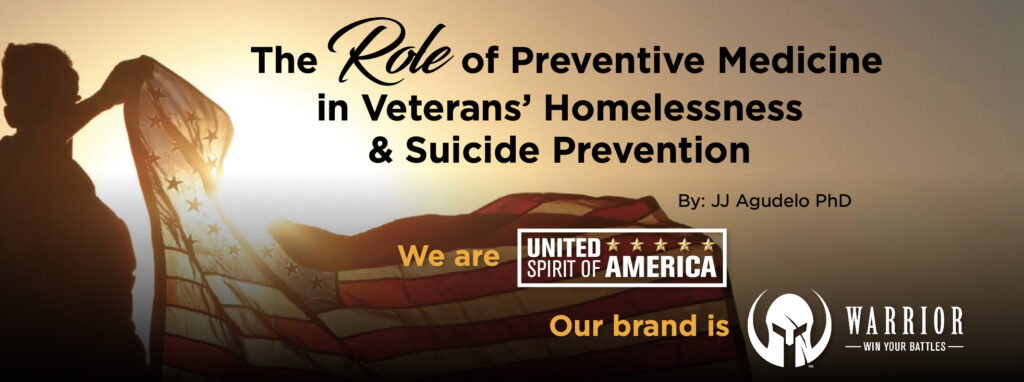
Warrior_PreventativeMed_HomelessVets_Rev012723
Preventive medicine is the practice of promoting mental and physical health care to improve patient well-being with the ultimately goal of preventing illness, disability, and death. The question is, what is the role of preventive medicine procedures and products on homeless veterans and suicide prevention?
There are three main components of preventive medicine. One, control of environmental factors that may affect mental and/or physical health, homelessness is one of the most aggressive factors that can and will affect a veteran. Two, control and prevention of occupational factors that could become hazardous to mental and physical health and being homeless generates all kinds of occupational risk factors; and finally, procedures and products that can prevent, or stop the occurrence and progression of physical diseases and mental illness that can cause physical and/or mental trauma.
There are sad stories and there is the story of a veteran who has no place to go and lives on the streets feeling abandoned and betrayed by the very country he/she love and served. A homeless veteran is constantly exposed to all kinds of multimorbid elements and circumstances that will directly and negatively affect his/her health and wellbeing.
Therefore, there may be no greater mission than to help a veteran avoid or exit homelessness, in that direction it is even more important to understand that homeless veterans have an elevated risk of suicide with a rate
of 35 per 100,000 compared to 26 per 100,000 for civilian adults.
A study by Jack Tsay PhD, Louis Trevisan, MD, Minda Huang MA and Robert H Pietrzak, PHD, MPH(1) at Yale University in collaboration with the U.S Department of Veterans Affairs in 2018 showed, that Veterans kill themselves at twice the rate of civilians, but even more critical is, that homeless veterans attempt to end their lives are five times more likely than their civilian and veterans counterparts.
Those statistics are unconscionable sad and devastating, especially when it is happening in the richest country that ever existed on the face of the earth, with the greatest Armed Forces that have the largest budget on
the planet.
In 2019 Dennis Culhane, Dorota Szymkowiak and John A Schinka (2) examined treatment for suicidality before and after a first record of homelessness (“onset”) among 152,519 veterans. Their conclusion was that homelessness should be considered a primary risk factor for suicidality.
Let’s dig into the psychopathology of veteran’s homelessness and suicide and the role of preventive medicine procedures and products that could contribute to a better outcome.
Warrior_PreventativeMed_HomelessVets_Rev012723
There are many challenges for a veteran. Among the most common are:
- » Unemployment, Homelessness & Substance Abuse
- » Lack of Transportation & Mobility
- » Extreme Poverty, Hunger & Malnutrition
- » PTSD, Acute Depression & Poor Mental Health
- » Common Contagious/Infectious Diseases due to Lack of Hygiene
» HIV/AIDS
» Chronic Pain & Musculoskeletal Disorders » Dental Disease
» Wounds & Skin Infections
» Lung diseases, such as Bronchitis, Tuberculosis, & Pneumonia
As we can see Homeless veterans have a plethora of high risk, high morbidity, high mortality scenarios, shortening their average life by 12 years than the general U.S. population.
This is a multifaced, multivariable medical/psychological complex situation that has evaded solutions per decades if not centuries, and each case is unique in its evolution and in its outcome. In other words, there
is not a “silver bullet” and any attempt to simplify its treatment is not only foolish but wrong. But, like everything in life, each step in the right direction is a gain, everything helps and better yet, everything adds up.
The same way the medical/psychopathological factors shows a history on every patient and how it progresses in a step-by-step down spiral, we can also work step-by-step back to add up treatments, interventions and procedures that could bring each one of these cases out and back as close as possible to a normal life.
Depression as a psychological mental health issue is prevalent in most if not all the homelessness cases and almost certain in every suicidal attempt one. Based on the risk circumstances and issues already presented, one of the first and most clear signs of clinical depression is the deliberate lack of personal hygiene on
a depressed individual. Lack of hygiene can be seen as a “red flag” and a “cry for help”, but more importantly a clear sign that intervention is needed immediately.
A veteran that is feeling abandoned, sick, and down can easily fall into a deep depression and unleash a down spiral series of events that can end up in losing their jobs, their family, their homes and ultimately their lives.
The psychological processes of a depressed individual can follow cognitive reiterative damaging thoughts of despair and anguish that are usually triggered by simple and otherwise natural events. What is an inconvenience for a normal person, can easily become a surge of negative thoughts processes filled with deep feelings of helplessness, guilt and overall sense of failure that make the patient reach wrong and damaging conclusion about his/her self-worth and social value.
Their mind can easily switch from a simple unfortunate event to a catastrophic sense of “this is just too much”. Negative recurrent thoughts and behaviors start taking place and a significant increase in use and abuse of drugs and alcohol usually, although not always, take place inducing the patient in self-destructive behaviors.
This is when the approach by clinicians, social workers and peers is most needed and effective, but the timing and support is critical. Little things at this point are huge. A shoulder to cry on, and hug at the right moment, a gift, a token or a sign of appreciation, listening without judgement… or simply put, being there, can mean the difference between life and death.
WE OFFER PEACE OF MIND
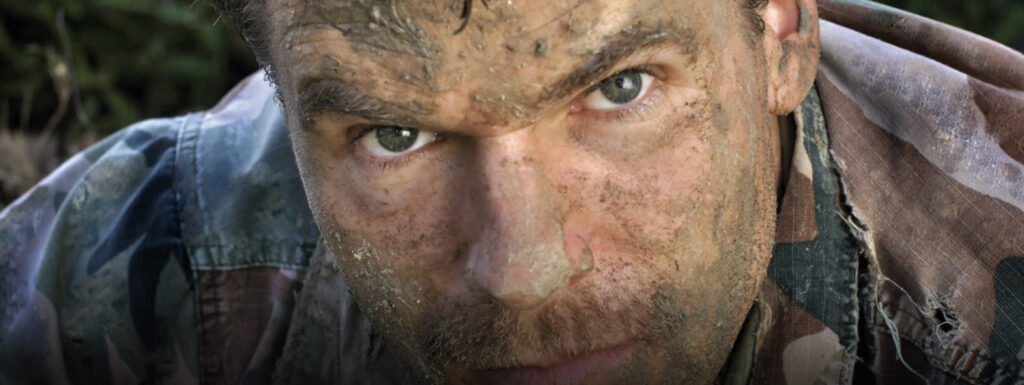
There are countless stories of veterans that at the brink of suicide received a visit, a meal, a token of appreciation, a shoulder to cry, that literally, saved their lives from total despair. Would these things be enough, of course not, but they may bring a second breath, a pause in desperate times, a grim of hope, and as I said before, in life, everything adds up.
Many times, that would not be enough, and the patient falls in the cracks of the system, and we lose him/her… but more times than not, little simple gestures of appreciation, bring renewed value, a ray of hope, that could start a new path out of the hole they are in… and we have prevented the worst and provided a life line for them to re-start their way back to recovery.
Many of us watch in horror how the number of homeless veterans fall ill by contagious diseases that could simply be avoided if only they have access to simple, inexpensive, and useful preventive medicine products.
A simple bacterial infection could become the trigger to a cascade of diseases that would take over the patient if they are not controlled on time.
So, if this is a possibility, why don’t we take the preventive approach and find simple things that we can do to provide these lost brothers and sisters with preventive medicine products and procedures that can easily translate into, “we value you”, “we care that you won’t get sick or sicker”, and more importantly… “we want you back”.
Reports from warfighters coming back from the battlefield show that among the things they miss more are a good warm shower, shaving, smelling good, that wonderful sensation that produces those great feelings of cleanliness, sharpness, and desirable appearance… but more important, the feelings of being healthy, groomed, and strong.
Feeling clean changes your mood and has a natural consequence in the way you think and see yourself and the world, even for a brief moment, changes. It works for all of us, and it is even more important for somebody in crisis.
Every crisis intervention unit that works on our homeless veterans, should be equipped with a standard issued “Preventive Medicine Kit”, some little inexpensive bag of goods with preventive medicine products that can provide the patient with an opportunity that he/she can immediately use to clean themselves and change the way they feel.
The psychological effects of a useful “token of appreciation” won’t solve the enormous homelessness and suicidal problem, but it may redirect, reframe and even change those awful feelings of despair, or helplessness even for a small and short period of time, which can give us an increase chance to take one more step in the right direction… and like I said, everything adds up and at points like these, everything that helps should and must be used.repels biting insects helps.
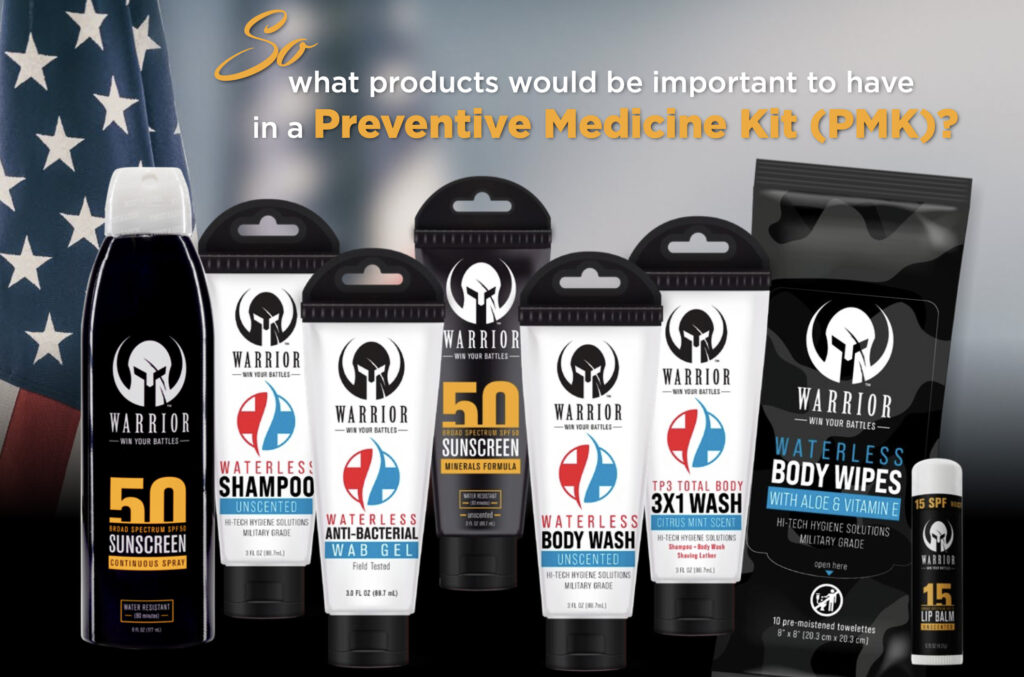
Let’s do a list that makes sense to a homeless person:
» Waterless Body/Shampoo Wash, because in most cases than not, homeless veterans have no place to take a bath. This innovative simple product designed to wash bed ridden patients, can be widely used by our homeless veterans without the need for a shower.
» Hand Sanitizer, this is so obvious that doesn’t need explanation. Clean hands are the number 1 source of prevention of most contagious diseases.
» Sunscreen, due to lack of use of this widely available and very much needed product, the incidence of skin cancers, such as melanoma are rising twice as fast in the veteran population, and we can almost guarantee that it is many times more on our homeless veterans.(4) (5) (6) Remember, our skin is the biggest organ in our body, not taking care of it usually brings long, painful, and deadly outcomes.
» Body-Wash Wipes, Handy clean wipes that allows the individual to do a deep cleaning is essential in preventing diseases. A bag of them would mean a lot to a homeless veteran.
» Lip-Balm, protects against wind, cold, hot and harsh environments. Any open wound, anywhere in your body is a source of infection and your lips are not exempt from that.
» Deodorant, bad smell is a clear sign of not being well, this product alone can bring the sensation that you don’t stink, that people don’t or won’t get offended by your presence, and that is a psychological preventive measure, but physically, antiperspirant deodorants, also provide a way to stop bacteria to grow on you.
I» nsect Repellent, vector induced diseases are not only common, but they are also deadly. Mosquitoes are the #1 killer around the world and their ability to spread contagious diseases are well documented. Anything the repels biting insects helps.
A veteran in crisis shows many things. But among the most painful is, the utterly failure of our society to help those in desperate need, especially of those who previously had put their life on the line to keep us safe.
Our efforts must not only be at the very end of a compounding unfortunate situation, but should be redirected to a preventative mind of work, where we can use every tool at our disposal to bring back our homeless veterans from the brink of disaster, and like I said, maybe a preventive medicine kit is not enough, but is better to have it and not need it, than need it and don’t have it.
Any clinician and social worker will gladly use all tools at their disposal to help their patients, therefore it is imperative that our leaders provide those tools so we can actually change the pervasive effects of homelessness in our beloved veterans.
References:
1.- Addressing Veteran Homelessness to Prevent Veteran Suicides. Psychiatric Services Volume 69, Issue 8, August 01, 2018, Pages 841-941.
2.- Suicidality and the Onset of Homelessness: Evidence for a Temporal Association From VHA Treatment Records. Psychiatric Services, Epub 2019 Jul 24, PMID: 31337320 DOI: 10.1176/appi.ps.201800415
3.- Mortality and cause of death in younger homeless veterans. Public Health Reports. 2018 Mar-Apr, 133(2) 177-181 PMCID PMC5871144. John A.Schinka, PhD, Katherine C. Leventhal PhD, William A, Lapcevic MPH, MS and Roger Casey PhD.
4.- Increased risk of skin cancer seen in military veterans. Jordyn Sava. Target Oncology. May 19, 2022.
5.- Coups EJ, Xu B, Heckman CJ, et al. Physician skin cancer screening among U.S. military veterans: Results from the National Health Interview Survey. PLOS ONE 16(5). https://doi.org/10.1371/journal.pone.0251785.
6.- Gall, R., Bongiorno, M., & Handfield, K. (2021). Skin cancer in the US Military. Cutis, 107(1), 29–33. https://doi.org/10.12788/cutis.0153


